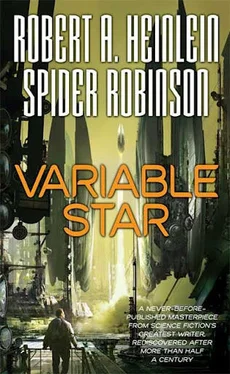“And good for Jinny, too,” he went on. “I’m more convinced than ever that she’s found just the man we need. And just when we need him, too.”
“‘We’?”
We frowned at each other for a few seconds.
“I don’t understand your question,” he said. “Unless you are speaking French.”
“I guess,” I said slowly, “I had the idea marriage involved the needs of just two people, and the interests of the rest of their families. So far, I’ve been thinking exclusively of Jinny’s needs and mine. If you need me for something, it has not yet been explained to me, and I have not yet agreed.”
His jaw did not drop. But his lower lip went slack, and his eyes unfocused slightly for a moment. Then he shook his head. “I know you are not stupid; I’ve seen your genes. I know you are not ignorant; I’ve seen your transcripts. It has to be… a rather staggering naïveté.”
I didn’t know what to say to that.
“Joel, do you honestly believe your marriage is going to be a normal, mundane union? Do you think its purpose is simply to provide the two of you with agreeable companionship and licensed sexual relief? Can you really imagine that your life together will be anything like what you were picturing as recently as yesterday morning?”
Well, no. But neither could I imagine what it would be like. The furthest I had gotten in my thinking so far was trying to encompass the preposterous notion that I could stop balancing my checkbook, now: that I would never again be short of money, no matter how much I developed a wish for. “What will it be like?”
“You kids will marry and continue in school under the name Johnston, but your legal name will be Conrad. Your training has been planned for you by experts familiar with your background and capabilities—at least ten years, and as a minimum you’ll take degrees in engineering, law, business administration, one of the practical sciences, and a language. I suggest Portuguese, but of course that’s up to you. It won’t all be academic fun and games, of course: you’ll need field experience in the company, as many areas of it as you can handle. Plus additional special coaching in social skills, and in politics, both governmental and corporate, and—”
“But you’re sure you won’t mind if I go for Swahili instead of Portuguese?”
“Anything but French.”
I gave up on sarcasm. He honestly didn’t know what it was. “You’re talking about grooming me for a top executive position in the Conrad empire. What makes you think—” I stopped because he was shaking his head.
“Not a top position,” he said.
I felt the blood start to drain from my head. “Are you trying to tell me—”
“Listen to me, Joel.” He leaned forward slightly, and his chair adjusted at once. “It is conceivable that one day you might sit in this chair and give the orders. It is even likely, on the basis of what can be extrapolated from your ancestry, present abilities, and accomplishments to date. It is certain that one or more of your children will sit in this chair one day. I’ve had you most fully investigated, else Jinny would never have received permission to propose to you.”
I felt two extremely strong and inappropriate impulses, fortunately so contradictory they canceled each other out: the urge to faint, and the urge to giggle.
“Oh, I understand,” he said. “Really I do, son. Your interest in music is commendable in one of your age, a sign of a mathematical mind, and Jinny assures me your work is agreeable, not at all like this… well. But surely you see the time for childish things is now behind you. The real world is now open to you: you’ve been given the opportunity to become one of those men music is written about .”
Conrad Continued Speaking for several more minutes, and I kept an attentive look on my face, but I’m afraid it all pretty much went in one ear and out the other from that point on. To the best of my addled recollection he was explaining my destiny to me. Telling me about challenges I would face, and things I would need to know to meet them—about looming crises and how to resolve them—about potential achievements and how best to realize them. He used the word “scarcity” several times. I think he was trying to give me a short course in how to run a commercial empire over the next hundred years or so. He went on and on about the crucial importance of making sure humanity was firmly established outside the Solar System. Something about the System, any system, being too fragile a basket for the human race to keep all its eggs in. It seemed paranoid thinking even for a Conrad.
I have no doubt there were thousands of people in the System at that time who would have given a limb, maybe even one of their own, to hear that lecture from that man. It’s a real shame I missed it. But my brain was so busy trying to think six contradictory thoughts at once that it had no processing power left over for new incoming audio or video. He could have told me the exact hour and manner of my own death, and I’d have kept on looking him in the eye and nodding thoughtfully. I think Mr. Albert may have realized I wasn’t tracking, but he kept silent.
Sooner or later, he would pause long enough for me to speak. I had until then to come up with some really smooth, diplomatic way to begin explaining to him how many erroneous assumptions he was making, how vast was the gulf between his picture of my future and my own. The trouble was, for the life of me I could not think of any diplomatic way to express the concept, “I’m not remotely sure I want any part of you or your family or your empire, and I’m having serious second thoughts about your granddaughter.” I could think of no gentle way to ask, “Excuse me, but are my own wishes, plans, thoughts, or opinions of any interest to you at all?” There didn’t seem to be a polite circumlocution for, “Who the hell do you think you are?”
Besides, I knew perfectly well who the hell he thought he was—and he was right. He was assuming my assent, not because I looked like some kind of patsy, but because nobody, weak or strong, ever said no to him. He assumed that I wanted to become him one day because everybody he knew did, because who would not? Jinny would never have taken up with me if I weren’t sensible.
I heard a story once about a PreCollapse songwriter named Russell who’d written a song called “I’m Lost in the Woods,” and because its melody sounded African, he decided he wanted a background chorus to sing the title in Zulu. But all the translators he found told him the same frustrating thing: there was no way to say “I’m lost in the woods” in Zulu. They didn’t have that concept. Zulu didn’t get lost in the woods. He had to settle for a chorus singing the Zulu for, “I am in the woods and I have gone crazy.”
There was no sense even trying to tell this man, “I do not want to become infinitely rich and infinitely powerful”—it would come through as noise. When that pause in his flow of words finally came, he was going to hear whatever I said as, “I have gone crazy.”
Well, if it didn’t matter what he heard, then I could say whatever I liked; the only question was what I wanted to say. Ideally, something that would not make me cringe every time I remembered this day in years to come. Something that would not force me to lie when asked what I’d told the old buzzard then. Something respectful, but dignified; polite but firm.
As I worked on it, I became aware of distraction. I played back the last fifteen or twenty seconds and spotted a plausible cause: a few sentences ago, he had dropped a subtle remark that implied, without stating it explicitly, that he was sure I had figured out Jinny’s real identity long ago… and that he applauded my good sense and good taste in continuing to play dumb for the sake of her feelings. It was annoyingly difficult to work out which of us he’d insulted worse—a distraction from the distraction.
Читать дальше










